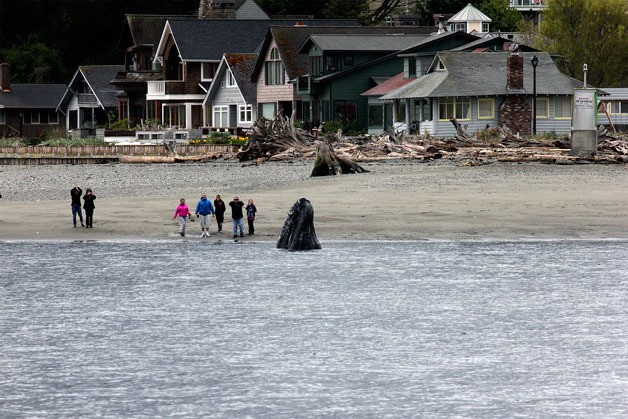Sand shrimp harvesting will resume around Whidbey and Saratoga Passage this summer after a two-year hiatus, though it will be done so on a limited basis.
Two harvesters will be granted three-year authorizations as early as June by the Department of Natural Resources. Harvesting must cease Feb. 1 through June 10, however, in an effort to leave gray whale feeding unabated, said Blain Reeves, assistant division manager of science, shellfish and invasive species management, aquatic resources division of the agency.
Harvesting was halted in April 2014 after Langley leaders successfully argued there was a lack of information about the impact of removing sand shrimp from gray whale feeding grounds, and that whales were not visiting the area as frequently due to a lack of food.
Reeves cited research, a void in the overall supply in the region for commercial enterprises and an effort to balance management goals on state-owned aquatic lands among the reasons for lifting the ban.
The research, conducted over the past two years by natural resources, the University of Washington, Central Washington University and Cascadia Research Collective, indicated a self-sustaining population of shrimp in the area robust enough to supply both fishing and whales, he said. Close to 10,000 metric tons of shrimp were available in whale feeding regions in 2015, while only 250 tons were consumed, according to DNR documents.
“There’s nothing to suggest there’s a sustainability issue,” Reeves said. “The big indicator is that the percent of the overall biomass being taken every year is such a small percentage that there is no shrimp biologist around that would say that’s a threat to the overall population.”
The decision isn’t without concern.
Langley Mayor Tim Callison and Orca Network co-founder Howard Garrett voiced their dissent. Callison envisioned a potential drop in tourism that often goes hand in hand with whale watching season, though he was hopeful the reduction in harvesting dates will prevent much of a blow.
“It seemed to have a very positive effect and I’d hate to see the whales decline in terms of the number of visits,” Callison said. “People come to see the whales.”
“We don’t want to diminish all opportunities of working off natural resources; we want to see it restrained so it positively impacts the whale population,” he added.
Garrett feared harvesters will deplete the amount of shrimp and that the whales won’t find enough to eat. Sand shrimp are a major source of food for migratory whales in the area, and a deprivation of shrimp could cause whales to look elsewhere for a more abundant supply. Garrett also said the decision may have been a year premature, due to shrimp needing three or four years to grow to maturity.
“They would not just rebound in one year, they would start to, but they would not rebound that soon,” Garrett said.
Fred Lundahl, a member of the Orca Network board and owner of Music for the Eyes in Langley, was concerned there is a correlation between the sparse number of whale visits over the past year and the shrimping of the area in the past.
“They never ate along the Whidbey Island side of the passage,” Lundahl said. “They were always over by Port Susan, Hat Island and Everett.”
“I envision that there will be enough stink raised that DNR will back off putting back the licenses for commercial fishing,” he added.
Callison, Garrett and other concerned parties will draft a letter in response to combat the decision.
Reeves said the halt in shrimping between February and June should mitigate any concerns over tourism as well as food supply. He added that while the impacts of the decision seem dire to the attraction of Langley, the new conditions were made to appease both sides of the spectrum.
Since halting the harvesting in April 2014, Reeves said the department has received approximately 100 calls from concerned citizens, fishers and bait stores ranging from Olympia to California. He said that two businesses have closed their doors during that time period, which was reassurance that the lift of the ban is needed.
“We think the financial benefit of the people is a worthy endeavor,” Reeves said.
Reeves said that he will be meeting with the Island County Marine Resources Committee in early June to present the research conducted by the department, as well as answer lingering questions.



